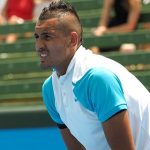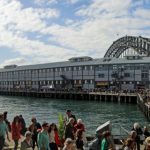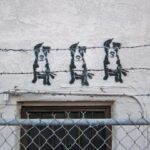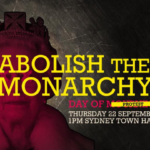“This Is Indefinite Detention”: Councillor Jonathan Sri on the Kangaroo Point Standoff
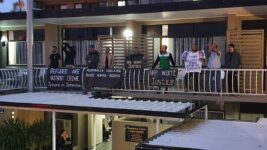
Right now, there’s around 120 former Manus and Nauru asylum-seeking detainees being held in Brisbane’s Kangaroo Point Central Hotel. This is after they were flown to Australia under the now revoked Medevac laws, as medical professionals assessed it was necessary due to their conditions.
So, these men have compromised health, which is something the coronavirus likes to target. Yet, they’re being incarcerated in an alternative place of detention (APOD) with no room to take social distance from one another, or the Serco guards that watch over them.
These men are not criminals. Successive federal governments have detained them over the past seven years, as political tools used to deter others from fleeing persecution from coming to this country, even though international laws our nation has agreed to deem it legal to do so.
The Kangaroo Point movement
Around 400 demonstrators gathered in Brisbane’s Raymond Park last Saturday and proceeded to march on the Kangaroo Point Hotel, demanding that the refugees be released into the community, where there are civilians willing to house them. Six of the peaceful protesters were arrested.
Initially, organisers had planned a sit-in demonstration to take place at the city’s Story Bridge. However, the Queensland Supreme Court granted the state attorney general an injunction to prevent that action from taking place.
Led by Refugee Solidarity Brisbane/Meanjin and Refugee Action Collective Queensland, the local refugee protest movement has led a sustained campaign against the ongoing detention of the men inside the hotel since the beginning of the pandemic.
This is despite ongoing police attacks, and as of June, it’s involved a 24/7 blockade out the front of Kangaroo Point Central.
A political scapegoat
Jonathan Sri is councillor for the Gabba Ward of Brisbane City Council. The Greens councillor has been a proactive supporter of the Kangaroo Point refugee movement since its inception.
Indeed, Queensland police arrested him at a June demonstration, only to later drop the charge because it was shown to be false.
Sri has been involved in the organising of some Kangaroo Point actions, but he wasn’t involved with the Story Bridge sit-in.
So, that’s why he found it quite odd when two police officers turned up at his home at 1 am on 8 August ordering him to turn up to court seven hours later in relation to the protest.
The officers waded through mangroves in the middle of the night, to reach Sri in his houseboat to serve him with the court order seeking to ban him from taking part in or promoting the Story Bridge action, despite the fact that the demonstration had been postponed by agreement at that point.
Sydney Criminal Lawyers spoke to Greens councillor Sri about the late night call the authorities paid him, the deplorable situation the asylum-seeking detainees find themselves in after years of being locked up, and why he believes the protest movement being forged in his city has legs.
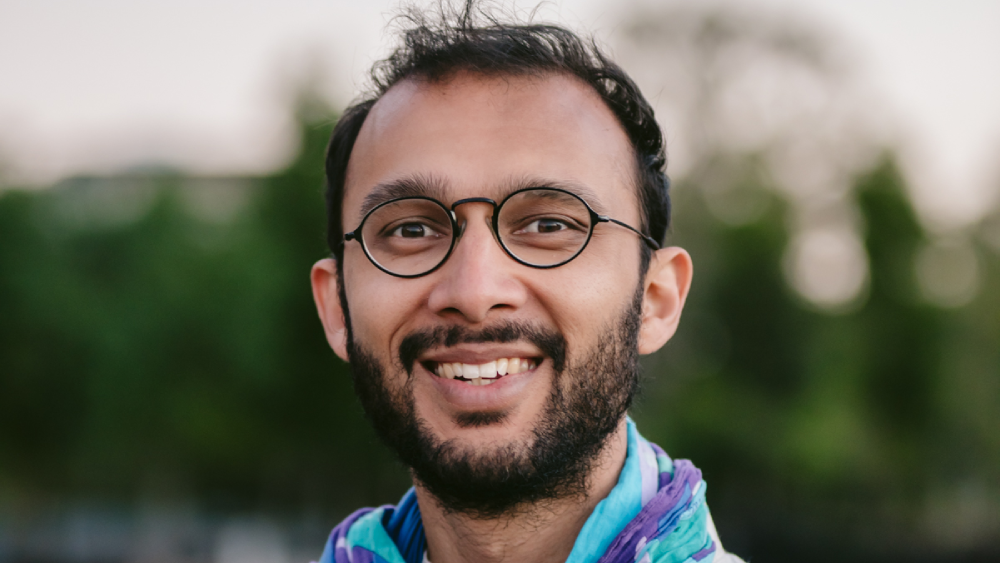
Firstly, on Saturday, hundreds of protesters gathered in Raymond Park and then marched towards the Kangaroo Point Hotel, where former offshore asylum-seeking detainees are being held.
Johnathan, how did it go last Saturday?
I wasn’t on the ground because of the Supreme Court order. But from watching online, and checking in with organisers afterwards, it went quite well.
It was pretty impressive to see such a solid turnout despite heavy rain and strong police repression in the lead up.
When police use heavy-handed tactics and court actions on protests, there is a concern that it’s going to collapse turnout. And it did reduce the numbers a little. But to see so many people show up in spite of so much opposition was quite inspiring.
The action served its purposes of continuing to draw attention to the detention of these men. And it proved that the movement has more staying power than people might have first thought.
Sometimes these sorts of actions can be a bit of a flash in the pan. So, for this to be still going after so many months is pretty exciting.
The Queensland Supreme Court granted state attorney general Yvette D’Ath an injunction to prohibit last Saturday’s originally planned protest, which was a sit-in at Brisbane’s Story Bridge.
Down in this state, NSW police has been taking the Black Lives Matter movement to court attempting to have its actions shut down. Advocates claim the government is using COVID as an excuse to silence dissent, whilst people are packing shopping malls.
What’s the story up there?
It’s definitely the case up here that the government is using any excuse to crack down on peaceful protest – sometimes it’s traffic disruption and sometimes it’s COVID.
There’s a clear pattern here with Queensland police and the state government essentially using any mechanism to prevent peaceful assembly.
We’ve seen quite a few notified assemblies taken to court and rejected on COVID grounds.
More recently, the court action regarding the Story Bridge rally focused more heavily on traffic impact. But the generalised concerns about COVID were clearly a motivating factor.
What is interesting is when the government or the police are making choices about which protests to crack down hard on and which to let go, they seem to be very heavily influenced by conservative commentators and commentary from the LNP.
Rather than looking objectively or rationally at what traffic impact a given assembly is likely to have – or what the genuine risks of virus transmission are – the deciding factor in whether the government takes a particular protest to court is entirely about public sentiment.
The police and the state government are highly susceptible to public sentiment. And they’re making political decisions based on it, but then disguising them as public policy decisions on health and safety, which is really concerning.
What we have seen in the last six months in particular is a ramping up of police hostility towards peaceful assemblies that goes far beyond anything I’ve seen in the last 10 years in Brisbane.
Even the 2014 G20 wasn’t as persistently aggressive and harsh towards protesters as what we’re seeing at Kangaroo Point.
That ties into my next question, as down here in NSW, the police presence at rallies of late has been overwhelming. At times there’s one officer for every couple of demonstrators.
How would you say the Queensland Police Service has been operating in relation to demonstrations in your state?
The Queensland Police Service has been very hostile towards any kind of peaceful assembly under COVID.
That hasn’t been based on any kind of objective criteria or rational analysis of the actual risks of transmission. It’s been based on a generalised dislike of protesting.
There is already a well-developed culture within Queensland police that protesters are troublemakers.
Even though they use the rhetoric that they support the right to peaceful protest, they only support that so-called right in circumstances when an assembly has literally no impact whatsoever on any other member of society.
The police claim they support peaceful protests, but they won’t support protests on roads.
They won’t support protests involving large groups gathering. They won’t support noisy protests, or those that have any negative impact on businesses.
So, as a result, literally the only kind of protest that they will support is one person standing by themselves in a square holding a sign.
Essentially, there’s a lot of doublespeak going on where police say they support the right to protest, but they then impose such strict conditions on peaceful protest that literally no effective protest is possible.
I’d add that sometimes what seems to be happening is that individual sergeants or inspectors want to win some points for themselves and think they can by going hard on protesters.
Then in other cases, the pressure seems to be coming from higher up, even from the attorney general’s department.
You’ve been a part of the Kangaroo Point protests from the beginning. You were arrested at a rally in June.
And quite bizarrely, some police turned up at your house at 1 am about a fortnight ago to serve you with an order to attend court the following day over a protest that had already been postponed.
There are now people in the press calling for you to stand down, claiming a councillor shouldn’t be acting in the way that you have been.
What do you think about the treatment you’ve been receiving?
I was arrested after one of the first large assemblies at Kangaroo Point, which was actually authorised, and we were lawfully allowed to block the road.
Police arrested me on the ground that I had failed to obey a direction. But it turned out when they reviewed the evidence, that I had obeyed the lawful directions.
They very quickly had to drop the charge. But they still haven’t publicly acknowledged that they made a significant mistake on that front.
I’m not the only person who has been targeted in that way. Another organiser was arrested for failing to comply with a move-on direction based on her presence on the footpath having caused anxiety to Serco guards inside the hotel.
It was truly a bizarre move on the part of Queensland police to arrest a young woman on the basis that her presence on the footpath was causing anxiety.
More recently, the decision to try and hold me responsible for the Story Bridge protest and serve me with documents at 1 am showed quite clearly the political motivations behind what the Queensland government is doing.
The protest this involved had been publicly promoted for three weeks and throughout that time, Queensland police had made no attempt to get in touch with me, although they were trying to get in touch with other organisers.
So, literally, the first notice I had that police even considered that I was involved was at 1 am on Friday night, when I was served documents to be in court at 8 am the next morning.
What I suspect happened, which we haven’t been able to verify yet, is that the attorney general’s department gave a direction that I should be named as a respondent in the matter.
Now, that’s a very concerning precedent, because it raises concerns that any public official who expresses support for a given assembly or protest will be targeted as a so-called organiser.
That can have a chilling effect on the right to peaceful assembly, and freedom of speech more generally.
Demonstrators are calling for the Kangaroo Point detainees to be released into the community. What sort of conditions are they facing inside the hotel? And what are the dangers involved for them?
A lot of people describe it as a hotel, but it’s a glorified three star motel. The men are sleeping multiple people to a room. They don’t have enough space to safely distance from one another or from the Serco guards.
They’re not allowed outside the compound, and they can only exercise down on the bitumen carpark for a couple of hours a day.
The men have no access to visitors. They don’t necessarily get food that meets their dietary requirements. We’ve heard complaints that people who need halal food haven’t been given halal food.
The men don’t have access to the health services and counselling services that they need.
These men have been in detention for seven years now, and they’re all experiencing mental health issues and physical health issues. But their access to healthcare and support is very restricted.
Recently, two men attempted suicide on the one night. They were taken to a nearby hospital for a couple of hours and then immediately returned to the detention facility, which is clearly not good practice when you’re dealing with people who are suicidal.
They should have been treated more carefully and supported so that their underlying health issues were properly addressed. Instead, they were thrown back into the same situation that triggered their mental health issues to begin with.
Overall, the men have very limited freedom of movement. They’re not allowed guests. They have no certainty about how long their conditions are going to continue like this.
That’s the core problem: there’s no release date. This is indefinite detention. And the government doesn’t have any resettlement plans for these people.
So, they’re really frustrated, particularly in circumstances where one of the guards at the Kangaroo Point Hotel tested positive for COVID, and Serco were taking no reasonable steps to ensure that the men’s health and safety was prioritised.
So, the detainees have come across from Nauru and Manus Island, under the now revoked Medevac laws. They have compromised health. And they haven’t been receiving the treatment that they came here for.
No. Many of the men have stories about how surgeries they required, or specialist treatment they required, still haven’t been received.
Some of them have stories about how their ongoing persistent health issues haven’t even been acknowledged by the government.
Although the government says that the men have already received treatment that’s not accurate. The government is mischaracterising what is going on for these men.
And it’s deliberately denying them the healthcare they need. I realise that’s a strong claim to make, but it does seem to be the case.
As you’ve mentioned, there has been a sustained protest out the front of Kangaroo Point since the beginning of the pandemic.
Since June, they’ve maintained a 24/7 blockade out the front of the hotel. How would you describe the ongoing effort the rally organisers have been making?
It’s been quite powerful and effective, not just because it’s drawn more media coverage and public attention to this issue, than we’ve seen for several years now, but also because it’s building direct relationships with the men inside, and letting them know that they’re not alone.
For people who’ve been in detention for seven years, and are really losing hope of ever getting out, to see that there are hundreds of people out on the street, supporting their release, willing to stay out late through the night in the middle of winter, in the cold and rain to call for their release is really valuable for their health and wellbeing.
But the blockade has also been powerful in terms of building relationships between activists and community groups.
In particular, we’ve seen a surge in younger people getting involved in refugee rights activism for the first time and building alliances with more established advocacy groups.
The implications of that long-term will be quite powerful, because historically, in Brisbane, it’s probably fair to say that refugee rights activism has tended to avoid more disruptive and antagonistic forms of protest.
People have relied heavily on letter writing, submission writing and other forms of nondisruptive protest.
But there’s a new generation of young activists, who are much more committed to disruptive civil disobedience, and see the strategic value in terms of drawing more attention to an issue. That’s only going to continue over time.
I expect this movement to diversify going forward and expand beyond Kangaroo Point.
Already, we’re seeing protests at Brisbane Immigration Transit Accommodation (BITA), near the airport, as well as protests in the CBD. And people are beginning to organise against other targets that are directly involved in the detention system.
The movement looks to be evolving beyond the blockade itself, and it’s hard to know what that will lead to.
As with any community movement, there are the usual challenges, ideological divergences and strategic disagreements, but the fact that people have such close relationships with each other, and in particular, with the men inside, gives this campaign a lot more resilience than some of the other protest movements we’ve seen in recent times.
And lastly, Jonathan, the government recently announced it’s reopening Christmas Island and it’s begun transferring detainees from WA’s Yongah Hill detention centre to that facility.
The ABF has stated no refugees will be sent to Christmas Island, while the Medevac detainees remain confined inside hotels in Brisbane and Melbourne.
How are you expecting things to play out from here? And what’s next for the protests?
The government has a track record of moving human beings around in detention like chess pieces.
Whenever there’s too much heat on a particular detention facility, they try to relocate people further away, out of sight, out of mind.
The decision to try and free up more space at Yongah Hill could be indicative of the fact that the government is trying to move people who are held in inner city hotels to more secure facilities, where they’re more distanced from protests and community relationships.
Although the government is saying they’re not sending refugees to Christmas Island, it’s important to understand that anyone who’s charged and convicted with even an offence like assault could potentially be sent there.
It’s not uncommon, for example, for an asylum seeker who’s been in detention for years and provoked by a guard to lose their cool and swear at them aggressively. That’s enough for the government and police to press an assault charge.
We do know there are cases of asylum seekers who are being sent to Christmas Island, as part of this Yongah Hill cohort. So, it’s not entirely accurate for the government to pretend that this is somehow a different group of people.
At the end of the day, the government is sending people in immigration detention to Christmas Island. So, regardless of what their technical reason is, it’s still part of the same broad approach of demonising and criminalising migrants in order to distract from the broader frustrations of the general public about the failures of neocapitalism.
Going forward we’re going to see more protests, and a more diverse range of tactics used in response to what the government is doing.
It’s hard to know how that will play out electorally and politically, but certainly, in my neck of the woods, I can see a lot of people are not just angry at the Liberal Party, but they’re also angry at Labor for not having done enough about this.
The distinction between this campaign and the Baby Asha campaign a few years ago is quite stark.
Back then, the Labor state government supported healthcare professionals in not releasing a refugee baby back into offshore detention. The healthcare workers would not release the child into a situation where they were going to be put in greater harm’s way.
The state government could be taking a similar approach now in resisting the federal government’s detention regime.
But, unfortunately, Queensland Labor has been a bit soft on that front. And it’s hard to know what’s going to happen in the long-term.


